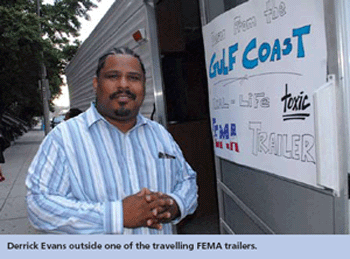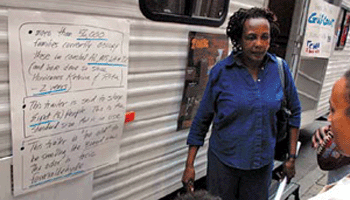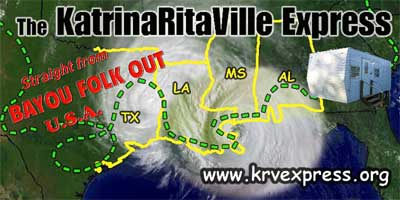Fighting Climate Change in Portlandia
Not only is failure not an option, those fighting to avert cataclysmic climate change have achieved important successes worthy of celebrating.
Photos by Lolita Parker, Jr.
An interview with historian, preservationist, community organizer, and economic and environmental justice activist Derrick Evans appeared in Dollars & Sense in March/April 2006. At the time, six months after Hurricanes Katrina and Rita struck the Gulf Coast, Evans already saw clear signs that a recovery designed by and for the majority of low- and middle- income people in the region was not what business and political leaders had in mind. Here is Evans' first-person account of a novel campaign to reframe the public discussion of Gulf Coast reconstruction by amplifying the voices of survivors.

On August 26, I headed south from Boston with a 32-foot FEMA trailer, one of two purchased on eBay for $5,500 apiece. More than 56,000 Mississippi and Louisiana families, survivors of Hurricanes Katrina and Rita, still live in toxic trailers like the one I was pulling. My mother moved out of hers about six weeks ago and only recently said that her eyes have finally stopped burning. In August, after two years of dodging, FEMA conceded that people are indeed getting sick from these things and pledged to relocate current occupants and offer refunds to those who have bought surplus trailers.
So why drive these trailers around the country? In brief: to highlight a range of unresolved and in some cases unaddressed recovery issues affecting virtually every marginalized community from coastal Alabama to southeast Texas, as well as the unique issues confronting evacuees scattered across the nation. A group of grassroots colleagues and survivors-- we are calling ourselves the Gulf Coast Peoples' Movement for Full and Fair Recovery--is coordinating the KatrinaRitaVille Express Tour, which will take to the highways of North America from now through the 2008 elections. For two years, news crews, congressional staffers, and others with at best sporadic and narrow appetites for things "Katrinaesque" have sometimes stumbled on real and important stories from the Gulf. More often, though, they have merely regurgitated a false and imbalanced narrative that portrays booming casinos, growing tourism, rebuilt petrochemical plants, and expanded transportation infrastructure as beacons of hope for Katrina and Rita survivors.

Our traveling FEMA trailers will help survivors and community advocates frame and publicize their stories themselves. The tour will also facilitate access to policy makers, funders, and others not readily accessible back home. Each trailer has been outfitted as a traveling museum, art piece, and media station that can transmit live broadcasts between the Gulf and tour sites across the country. Working with several regional networks of local organizations, the tour will feature over 100 Cajuns, Blacks, Latinos, Asians, Native Americans, and Whites from Alabama, Mississippi, Louisiana, and Texas (and evacuees elsewhere), all of whom have powerful stories they are eager to tell.
Stops will include presidential debate sites, evacuee locations, places of worship, and schools. The trailers (dubbed the Michael Brown Bomber and Haley's Comet) have already made a few informal, pre-tour appearances: in Boston, with New Orleans' Hot 8 Brass Band and the Finding Our Folk tour; at an Iraq War protest near the Bush family compound in Kennebunkport, Maine; at Katrina anniversary events in New Orleans and coastal Mississippi; and outside of Jimmy Buffett's recent concert at Gillette Stadium in Foxboro, Mass. (With enormous federal tax incentives, Buffett and Harrah's Entertainment broke ground last month on a $1 billion "Margaritaville" casinoresort in East Biloxi, Miss., where, at the same time, rebuilding by Vietnamese and other disaster victims remains stalled by insurers, mortgage companies, local zoning officials, and Mississippi's painfully slow housing recovery grant program.)

The tour aims to dramatize the overall crisis, multifaceted yet of a piece, that continues to confront the Gulf Coast's most overlooked people and places. While poor and minority survivors and activists will agree (if anyone asks them) that they face multiple, interconnected disasters in the aftermath of Katrina and Rita, this basic local insight goes largely unrecognized. Government failure is certainly most responsible for a "recovery" that has been arbitrary, resource-driven, and slow rather than holistic, need-driven, or effective. But no one, progressives as a group included, has adequately depicted, let alone offset, that failure. Narrowly focused aid has often segregated otherwise related issues, making one or another worse and masking the lack of an overall plan. Residents of the region feel tremendous gratitude to the tens--if not hundreds--of thousands of volunteers whose countless hours of labor, along with their financial contributions, are primarily responsible for what rebuilding has occurred. However, this individual good will is no substitute for the kind of comprehensive, coordinated, and sustained response that is needed from government at all levels.

Unfortunately, no thoughtful and coordinated response will occur without a compelling grassroots push for community visibility, multi-issue awareness, and broad social justice for Gulf Coast survivors. Our region today remains in a cultural, environmental, economic, and human rights crisis no less severe than its more frequently discussed housing crunch and extending far beyond the parishes of its famed city, New Orleans. The media, policymakers, academicians, and private funding groups repeatedly fail to recognize regional connectivity or to challenge the basic invisibility of the Gulf Coast's multiply wounded communities and ecosystems--together, its very soul. Our community-driven and multi-issue platform will, we hope, eclipse the piecemeal analyses and responses that are moving social justice and equitable recovery nowhere fast. The KatrinaRitaVille Express tour aims to build awareness and support for just such a platform.